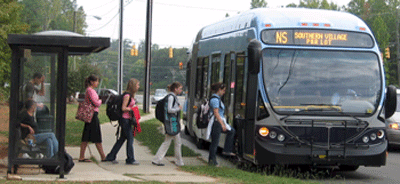OP Editors's blog
{Cross Posted from Chapelboro.com}
With our elected bodies coming back into session any day now, it's timely to think about how Orange County residents are being engaged in the decisions our elected officials make on our behalf. A post here on OrangePolitics got Chapel Hill resident, Matt Bailey, thinking about ways to engage residents that do not require them to come out in the evening and sit for hours waiting for their three minutes. So, he shared his ideas over on Chapelboro.com (below). What do you think of these ideas? What ideas do you have? Where should elected offical go to hear from constituents? Post your thoughts.
“Town leaders aren’t listening to the people.”
We heard that claim repeatedly from several candidates running for public office in Chapel Hill last fall. With the promise they would listen to the people, several of those candidates have now been elected officials for almost a year.
For the first time, Carrboro will be getting transit service from GoTriangle. Starting on Monday, August 8th the 405 Route will have two stops in Carrboro, one on Jones Ferry Road at the Collins Crossing Apartments and the other on E. Main Street at Weaver Street Realty.
Join Carrboro Mayor Lydia Lavelle, Carrboro Alderperson Damon Seils, other Orange County officials, GoTriangle staff, Carrboro notables, and transit advocates as we celebrate this milestone on Monday at the E. Main Street stop to board the 8:14 am departure. GoTriangle will be providing local coffee, doughnuts, and complimentary day passes for anyone who boards at the E. Main Street stop.
See the GoTriangle press release for more information and the new route:
For Immediate Release
Contact: Brad Schulz, 919-485-7434 or Mike Charbonneau, 919-485-7413
Carrboro to Durham Transit Service Begins Next Week
Research Triangle Park, NC (August 3, 2016) - Carrboro residents will have weekday transit service to Durham beginning on Monday, August 8th.
A common complaint in Chapel Hill is that homeowners bear too great a tax burden because the town lacks a significant commercial tax base to offset it. The town’s onerous development process limits the amount of commercial space that can be built while also limiting the construction of new, different, and denser housing that is affordable to a wider range of people. At the same time, through the Neighborhood Conservation District (NCD) process, the town further restricts the availability of some areas for redevelopment, effectively freezing large areas of Chapel Hill in time. Removing these areas from potential redevelopment results in even less land for the creation of new mixed use and less single-family detached suburban type development to shift the tax burden. If our town is serious about supporting affordability, NCDs are counterproductive, “protecting” large swaths of the town that cannot be developed into denser urban environments.
{Cross Posted from Chapel Hill News}

If you boarded a Chapel Hill Transit bus back in February, you might have been greeted by someone with a clipboard asking you to answer a few questions about your ride. The results of this survey were just released and include relevant and interesting findings as we think about the future of transit in our community.
These survey data tell us quite a bit about who rides Chapel Hill Transit. Most riders (88 percent) were somehow affiliated with UNC, and 93 percent of those surveyed were taking the bus to get to college or work. A majority (68 percent) ride the bus five days a week while another 21 percent use it three or four days a week.
Arrive to the meeting a little early. Sign up with the clerk. Take a seat. Wait. And wait. And wait. Hours later, the governing board arrives at the agenda item of your interest. The presenter takes to the podium to introduce the topic to the board and the community. After some back and forth between board members and the presenter, the mayor finally announces the start of public comment and begins calling names off the list. Three minutes per person, loosely enforced (if at all). On controversial topics, this can go on for hours, all under the guise of public engagement.
Pages
About Us
OrangePolitics is a not-for-profit website for discussing progressive perspectives on politics, planning, and public policy in Orange County, NC. Opinions are those of their authors. Learn more.
Community Guidelines
By using this site, you agree to our community guidelines. Inappropriate or disruptive behavior will result in moderation or eviction.
Zircon - This is a contributing Drupal Theme
Design by
WeebPal.



